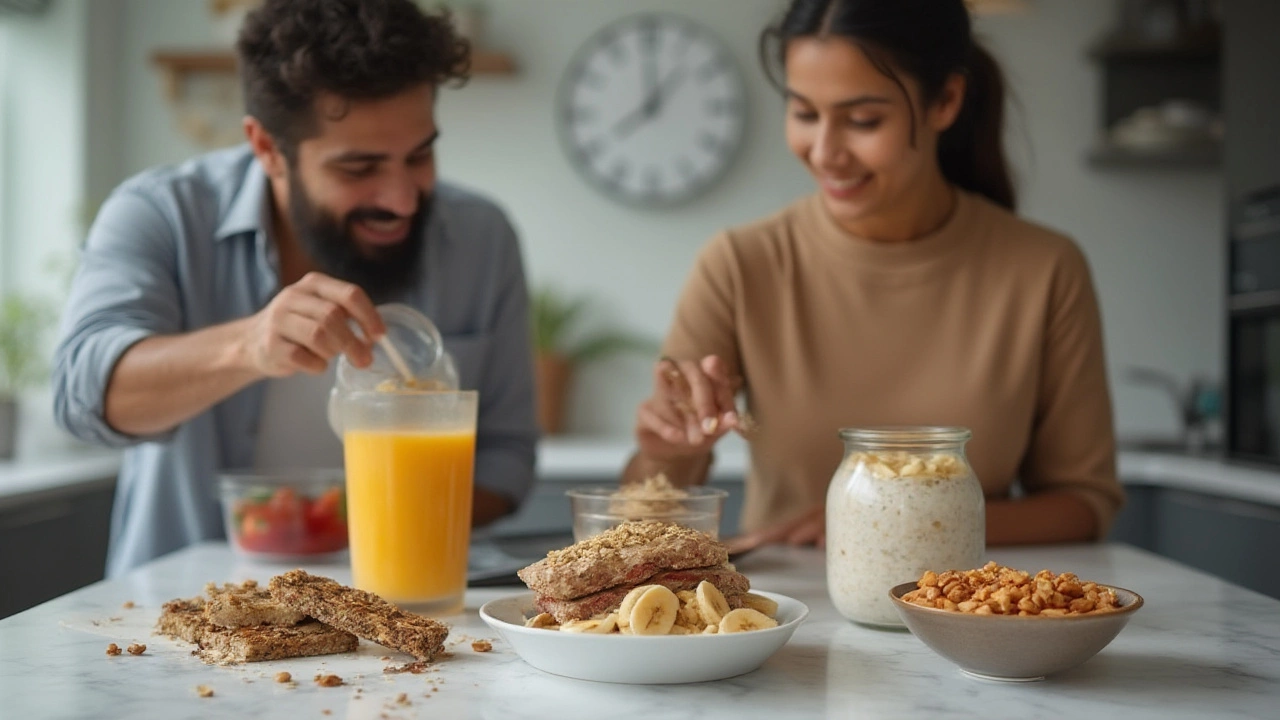
Forget everything you think you know about breakfast. People are still skipping it, grabbing sugary biscuits on the go, or settling for bland toast simply because 'there’s no time.' Yet, scientists have literally proven—skipping a healthy breakfast can mess with your energy, focus, and gut. It’s not just about a quick bite. What we eat first shapes the whole day: your blood sugar, appetite, even your mood. And here’s the kicker—most quick breakfasts aren’t healthy! So, what actually is the healthiest quick breakfast? It’s not a packet of biscuits, nor is it just a banana (however much Instagram says so). Let’s break down what your body really craves in the morning, and how you can speed up your breakfast routine without selling your body short.
What Makes a Breakfast Truly Healthy?
Let’s get real—healthy breakfast isn’t code for boring food. The magic formula? Carbs for energy, protein to keep you full, healthy fats for your brain, plus color and fiber from fruits or veggies. Studies show the most satisfying breakfasts—think ones that stop you from reaching for an 11am snack—include 15-30 grams of protein, a moderate serving of complex carbs, and something fresh or fermented (hello, probiotics!).
Classic Indian breakfasts like idli with sambar, moong dal chilla, or a vegetable upma tick more boxes than sweetened cornflakes ever can. Why? Idlis give you fermented goodness, sambar is loaded with protein and antioxidants, and upma gives you slow energy thanks to semolina. But if you’re short on time, these sometimes feel like a stretch. The trick is in clever swaps and prep. Even overnight oats work—if you skip the sugar and load them up with chia seeds, nuts, and real fruit. Add yogurt for extra protein and good bacteria (gut health, anyone?).
What sets the *healthiest quick breakfast* apart is balance. If it spikes your blood sugar and leaves you yawning at ten, ditch it. Choose fiber over white breads, pack in a handful of nuts or seeds, and don’t be afraid of a boiled egg. Want something vegan? Smashed chickpeas with tomatoes on toast gives you fiber, protein, and taste. Research from Harvard School of Public Health even points out that folks who eat a high-protein, high-fiber breakfast have better memory and less afternoon snacking. That means what’s in your plate really matters for the long haul. Keep things simple, but never boring.
Speedy Breakfasts: Real Solutions for Busy Mornings
Everyone loves the idea of a slow, luxurious breakfast. Reality? You’re likely running late, scrambling for shoes, and hoping you don’t burn your toast. But healthy and fast actually go together better than you think. The trick? Planning just that tiny bit the night before, and stocking your kitchen with the right stuff.
Here are quick breakfast blueprints you can actually follow, even on the most rushed mornings:
- Overnight Oats: Five minutes the night before, and your breakfast’s ready before your alarm even rings. Mix rolled oats, chia seeds, diced fruit, and a spoon of yogurt (or plant milk). Put it in the fridge —that’s it.
- Egg Muffins: Crack some eggs with chopped spinach, tomatoes, and onions into a baking tray, bake, and stash them in your fridge. Grab and go!
- Moong Dal Chilla Wraps: Make a quick batter with soaked moong dal and a bit of besan, throw in shredded veggies, and spread it like a dosa on a hot pan. Use it as a wrap around some paneer or leftover sabzi.
- Fruit & Nut Parfait: Layer yogurt, seasonal fruit (berries, mango, papaya), and chopped nuts in a jar. Easy to pack, even easier to eat in the car (not that we’re recommending distracted driving!).
- Besan Toast: Mix besan (gram flour) with water, spices, and herbs. Dip whole wheat bread and roast it on a nonstick tawa. You get protein, spices, and fiber in just eight minutes flat.
Real talk: you don’t have to cook fresh every morning. Batch prep some elements—like making a big bowl of salad veggies, boiling beans or eggs, or blending chutneys for dosa or upma. Use leftovers from dinner smartly, add a squeeze of lemon or a sprinkle of seeds, and layer up those flavors. Even two chapatis rolled up with hummus and grated carrot can count as a good breakfast when you’re short on time!
The worst quick breakfasts? Anything processed, deep-fried, or packed with hidden sugar. Step away from those instant noodles and sugar-syrup cereals. They’ll drag your energy down within a couple of hours, leaving you cranky or anxious before lunch. Look for foods as close to their natural form as possible—said every nutritionist ever, and for good reason.

Protein Power: The Nutrient Your Morning Needs Most
Tired of hearing about protein? Sorry, but it really is the magic bullet for a satisfying, energetic start. In fact, a study from 2023 found that breakfast eaters who got at least 20 grams of protein (think: two eggs, or a cup of Greek yogurt, or a big handful of cooked dal) had steadier blood sugar and stayed full for much longer. Their moods? Better, more focused, and less likely to snap at coworkers on Monday morning.
Most quick Indian breakfasts can boost their protein with just a tiny shift. Add a boiled egg to your poha or upma. Stir hemp seeds or roasted chana dal into your overnight oats. Use soy chunks or paneer in a veggie wrap, or even blend peanut butter with banana for a nutty smoothie. Basil seeds (sabja) swell up in yogurt and bump up your protein—and they help with digestion, too!
Don’t fall for the myth that you need expensive supplements or protein bars stuffed with artificial sweeteners. Real food wins. Grab idlis, chillas, or a bowl of dalia with some nuts. Even leftover rajma can be refried and spread on toast. Lassi or buttermilk isn’t just a cooling drink—add chia seeds and it can be an entire breakfast by itself.
Of course, protein matters for every age group. Kids who eat a protein-rich breakfast tend to score higher on memory and math tests, according to a recent trial in Indian schools. Women need enough to maintain muscle mass (especially if you’re juggling work and home all day), and older adults use it to keep bones and joints healthy. So, a breakfast with protein isn’t just smart—it’s powerful at every stage of life.
Smart Carb Choices: Why Fiber and Quality Matter
Don’t run from carbs—they’re your morning’s fuel. But not all carbs are created equal. White bread, sugar-syrup cereals, or biscuits give a quick jolt, then fade fast. Your best bet? Slow-burning carbs that come naturally packed with fiber. Think whole wheat, millets, rolled oats, or poha (flattened rice). They break down gradually, keeping you full and carrying along nutrients like B vitamins, iron, and magnesium you’d otherwise miss in refined foods.
If you want the healthiest quick breakfast, pay close attention to the color of your plate. More colors, more nutrients! Yellow moong or turmeric spiced oats, green spinach, red tomatoes, orange papaya—the more natural color, the more antioxidants and fiber you’re getting. Try subbing regular wheat with millets for dosas or upma. Bajra and jowar are suddenly showing up on urban breakfast menus for a reason—they’re easier to digest, gluten-free, and keep blood sugar steady.
Fruits are great, but they don’t have to stand alone. Pairing them with protein or healthy fat (like peanut butter, yogurt, or seeds) means your body digests the sugars more slowly, leading to steadier energy. The science is simple: fiber and protein together prevent energy crashes and sugar cravings by 2pm. It’s not about slashing carbs, but choosing ones that play nice with your gut and brain.
For an extra fiber boost, toss a tablespoon of flaxseed or chia seeds into your porridge or add a handful of sprouts to your sandwich. Your gut will thank you—seriously! Good gut health connects to stronger immunity, balanced moods, even glowing skin.

Building a Quick Breakfast Routine That Lasts
The reason why most people don’t stick to a healthy breakfast habit? Complication and boredom. So here’s the secret—keep it simple, but never repeat the same bland thing every day. A little variety goes a long way in keeping your tastebuds and your body happy.
First, audit your kitchen. Stock up on quick-cooking whole grains (oats, millets, poha), eggs, dal, plain yogurt, seasonal fruits, and a jar of mixed nuts and seeds. Chutneys or nut butters are awesome for flavor punches. Then, keep your basics in rotation. Monday? Overnight oats. Tuesday? Moong dal chilla. Wednesday? Veggie upma or millet dosa. Thursday? Scrambled eggs with spinach. Friday? Yogurt parfait. Leave the weekends for something fun like vegetable parathas or pancakes with real fruit.
If you must have something sweet, avoid processed sugars. Dates or fresh fruit make excellent natural sweeteners. You can even try jaggery in place of sugar for iron and a deeper flavor. A little squeeze of lemon or a pinch of cinnamon perks up bland breakfasts and makes nutrition feel like a treat. Don’t forget hydration—herbal teas, coconut water, or just plain water set your metabolism on track for the day.
Feeling lazy? Set out ingredients the night before, so your morning self can just throw things together. Invest in a good thermos or insulated container if you eat on the go. And remember, a healthy breakfast habit isn’t about perfection—it’s about a doable routine that makes you feel good without slowing you down.
Healthiest quick breakfast meals don’t require chef skills or an extra hour in bed. They simply need honest, real ingredients and a pinch of planning. The right breakfast can flip your days from sluggish to supercharged, from snack-hunting to fully satisfied. The science backs it up. So next time you’re tempted by a store-bought pastry, remember: your best morning is just a bowl, a wrap, a chilla, or a jar away.